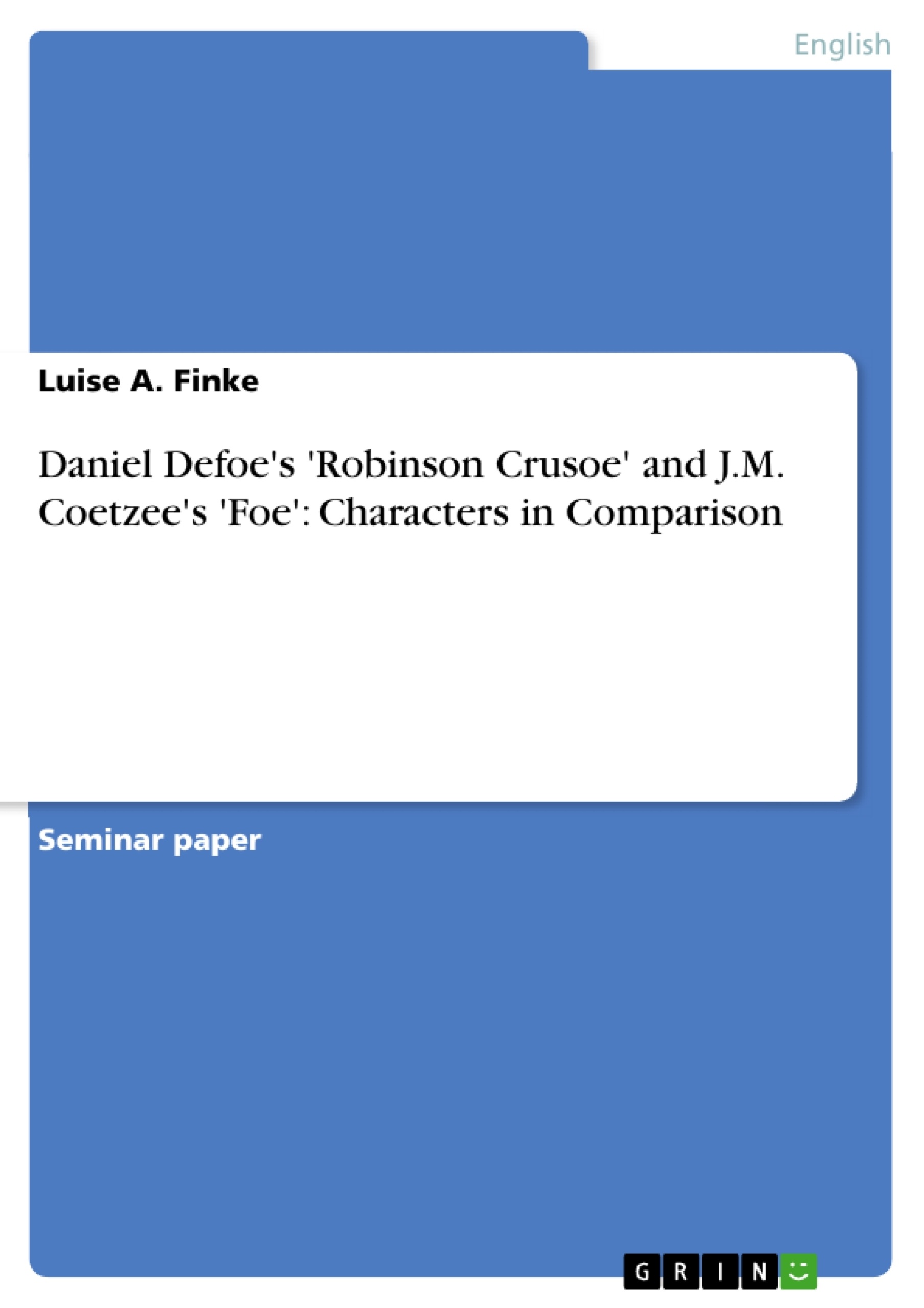J. M. Coetzee's 1986 novel Foe leaves its reader in a tumble of a multi-layered reality, confused
about literary original and copy, and, maybe most grave, confronted with the question: what is
historical truth and how can it be recognised. The veils that unfold and reveal the facets of fiction and
reality through the novel are many, and they are intricately woven into each other. We, the readers,
however educated and experienced with fictional texts, may find ourselves slightly confused after a
first reading.
Coetzee has written a parody1 of a classic of world literature: Daniel Defoe's Robinson Crusoe, first
published in 17192. The simple fact that Coetzee's work of fiction was first published in 19863 makes
it evident that it was based on the older classic. Yet the content of the novel claims the very opposite
when the female protagonist Susan Barton tells how the story really was before Mr Foe sat down to
turn it into a novel of his own intentions, altering and falsifying it. She tells her own story in the Iperspective,
in terms of the 'plot' even before the writer Mr Foe would have completed his
'Robinson Crusoe'. Through this, Coetzee creates the illusion that Susan Barton's report might have
indeed been the antecessor of the literary classic Robinson Crusoe.
Nevertheless, we are talking of a work of fiction here, so there is no doubt that Coetzee marvellously
plays with the means of storytelling instead of telling the world 'how it all really was'. There is no such
Robinson Crusoe as depicted both in Defoe's and Coetzee's novel - there is merely fiction, and one
should not confuse fiction and reality, however many layers of both seem to be mingled into each
other in Coetzee's novel.
1 A parody according to Linda Hutcheon is an: "imitation characterised by ironic inversion", or "repetition with
critical distance, which marks difference rather than simularity";
in: Linda Hutcheon, A Theory of Parody: The Teachings of Twentieth-Century Art Forms. New York and London:
Methuen, 1985, p.6
2 See: Bibliographical Note; in: Daniel Defoe, Robinson Crusoe. London: Dent, 1975, p. xiii
3 First published in Great Britain by Martin Secker & Warburg 1986; here it will be referred to the Penguin
paperback edition of 1987 when quoting passages from the text.
Table of Contents
-
I. J.M. Coetzee's Foe: a literary parody with political attitude
- [1] The spiderweb of fiction and reality
- [2] Literature shaping cultural images - Robinson Crusoe and Colonialism
- [3] Foe: the title as hints to the character of Coetzee's novel
- [4] White South-African J.M. Coetzee writing on behalf of the 'voiceless'
-
II. Character alteration from Defoe to Foe
- [1] Cruso: the anti-hero
- [2] Introducing a female narrator - the character of Susan Barton
- [3] Friday: the voiceless
- III. Fiction and metafiction: how many layers does truth have?
Objectives and Key Themes
This paper analyzes J.M. Coetzee's 1986 novel Foe as a parody of Daniel Defoe's Robinson Crusoe, exploring the interplay between reality, fiction, and metafiction. It examines how Coetzee's novel critiques colonial attitudes, exposes the limitations of historical truth, and questions the power dynamics inherent in storytelling. The author's own identity as a white South African writer writing on behalf of the 'voiceless' adds another layer of complexity to the analysis.
- The relationship between fiction and reality, exploring the layers of truth in Coetzee's novel
- The critique of colonial attitudes and power dynamics represented in Robinson Crusoe and its reinterpretation in Foe
- The role of the author and the influence of their background and intentions on the narrative
- The use of metafiction to question the authenticity of historical narratives and the representation of marginalized voices
- The examination of character alteration from Defoe's work to Coetzee's, focusing on the portrayal of Robinson Crusoe, Susan Barton, and Friday
Chapter Summaries
The first chapter delves into the multi-layered reality of Coetzee's Foe, analyzing how the novel plays with the concept of literary originality and the question of historical truth. The author examines the novel's relationship with Robinson Crusoe as a parody, highlighting the intricate web of fiction and reality woven into the narrative.
The second chapter explores how Coetzee's novel utilizes the original Robinson Crusoe to critique colonial attitudes and their impact on cultural images. It analyzes how Defoe's novel reflects the spirit of its time and how Coetzee, by rewriting the story, challenges these perspectives. This analysis also examines the significance of Friday's voicelessness and the metaphorical implications of his condition.
The third chapter delves into the title Foe, analyzing its multiple connotations and its connection to the themes of falsehood, opposition, and the critique of historical narratives. This section explores how Coetzee's novel functions as a form of anti-historiography, offering a perspective on the "story" from the viewpoint of the marginalized.
The fourth chapter examines the complexities of Coetzee's position as a white South African writer writing on behalf of the 'voiceless'. It discusses the author's background and how his identity contributes to the novel's critique of colonialism and the representation of the oppressed.
Keywords
This analysis explores key concepts such as literary parody, fiction and metafiction, historical truth, colonialism, cultural images, authorship, marginalized voices, and the representation of power dynamics. It delves into themes of colonialism, slavery, and the South African Apartheid system, examining the role of literature in shaping cultural perceptions and questioning the authenticity of historical narratives.
- Citar trabajo
- Luise A. Finke (Autor), 1998, Daniel Defoe's 'Robinson Crusoe' and J.M. Coetzee's 'Foe': Characters in Comparison, Múnich, GRIN Verlag, https://www.grin.com/document/21433



